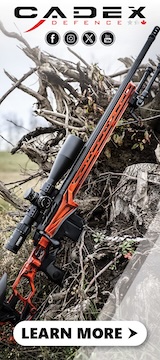Situational Overview
Bullets fired from hunting rifles have had the capability of hitting targets at long distances for many decades. Regardless of these capabilities, sportsmen have historically held themselves to an ethical standard of not taking excessively long or risky shots at the big game animals they pursue. New shooting technologies now being developed and promoted for use in hunting are encouraging hunters to shoot at substantially increased distances. These new technologies, while not illegal, are tempting hunters into taking longer and longer shots, which is raising significant ethical questions, including those of Fair Chase and intent.
The distance at which a shot is considered “long-range,” ethical, or unethical cannot be defined by specific yardages because this varies with each individual situation. It depends on equipment, shooting conditions, the species being hunted, the hunter’s experience and marksmanship skills, and other variables. It also depends on the commitment of every responsible hunter to avoid inflicting undo suffering, to make quick and humane kills, and to make every effort never to waste animals pursued as legal quarry. It is widely acknowledged that the likelihood of wounding, and the challenges of tracking, and recovering animals increase proportionally as shooting distances increase.
Hunting must involve the risk of detection and failure if there is to be any honor in having overcome the superior senses and survival instincts of the hunted. It is for this reason that sportsmen have embraced limitations so that technology does not fully overwhelm the natural capacities of the prey they pursue. This is a self-imposed trade-off that decreases the likelihood of a successful harvest, but heightens the hunting experience and shows respect for the animals being hunted. Combined, these values represent the intent and cherished traditions of hunting.
Position
The Boone and Crockett Club believes the term “long-range” shooting is more defined by a hunter’s intent, than any specific distance at which a shot is taken. If the intent of the individual is to test equipment and determine how far one can shoot to hit a live target and if there is no motivation to risk engagement with the animal being hunted, this practice is not hunting and should not be accorded the same status as hunting. If the intent is to get as close as possible for a sure shot within a person’s maximum-effective range out of concern for taking an accurate and safe shot, they are hunting. Making the choice to shoot from where you are or attempt to get closer is a very important question. If in doubt, stretch the stalk, not the shot.
The Boone and Crockett Club maintains that hunting, at its most fundamental level, is defined by a tenuous and unpredictable relationship between predator and prey. This is an intrinsic, irrefutable and intimate connection that cannot be compromised if the hunter is to maintain the sanctity of this relationship and any credible claim that hunting is challenging, rewarding, respectful of wild creatures, and in service to wildlife conservation. This connection is built upon many complex components that differentiate hunting from simply shooting or killing.
The Club finds that long-range shooting takes unfair advantage of the game animal, effectively eliminates the natural capacity of an animal to use its senses and instincts to detect danger, and demeans the hunter/prey relationship in a way that diminishes the importance and relevance of the animal and the hunt. The Club urges all hunters to think carefully of the consequences of long-range shooting, whether hunting with a rifle, bow, muzzleloader, crossbow, or handgun, and not confuse the purposes and intent of long-range shooting with Fair Chase hunting.
Discuss.






































































